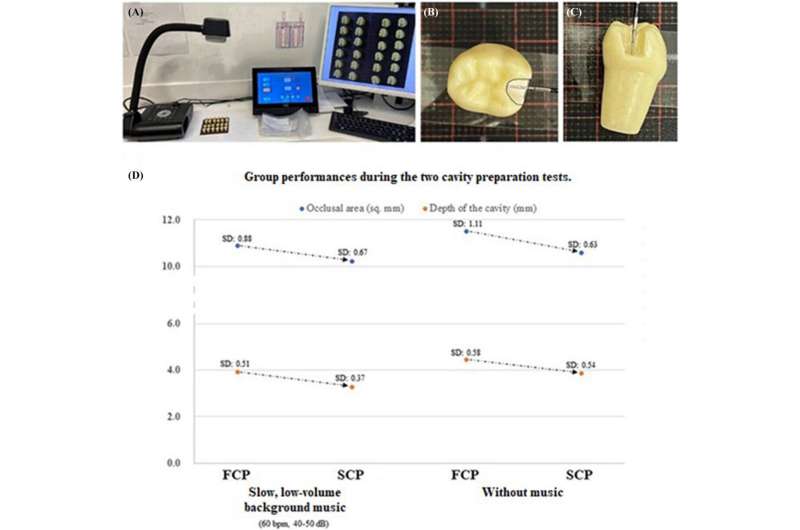This article has been reviewed according to Science X's editorial process and policies. Editors have highlighted the following attributes while ensuring the content's credibility:
fact-checked
peer-reviewed publication
trusted source
proofread
Background music found to reduce dental students' stress and improve their performance

In a pilot study carried out at the University of Eastern Finland, the use of background music was found to reduce dental students' stress and improve their performance during preclinical tooth preparation exercises. The results were published in Journal of Dental Education.
We hear music almost everywhere we go. Research on music in various environments has supported its positive effects on emotions and well-being. Evidence also suggests that background music can foster education and learning and has the potential to increase student satisfaction and productivity. However, data on whether background music has an influence on the anxiety levels of preclinical dental students during practice, or whether it alters their performance, is scarce to non-existent.
The acquisition of manual skills and procedural competence is of vital importance in preclinical dental training. Even basic dental skills, such as tooth preparation and polishing, can become difficult in the cognitively demanding new environments where the undergraduates must learn how to triage and act.
The present prospective cross-sectional pilot study compared the performance of 36 young dental students on a cariology course during phantom head training exercises in a simulation laboratory without background music or listening to quiet, low-tempo background music. The objective was to determine if music has an impact on dental students' anxiety, satisfaction, and performance during the exercises. The students' perceptions were surveyed, and quantitative, computer-aided measurements were taken to analyze their performance.
The students' overall satisfaction in the background music was high. Music was found to reduce stress while also increasing the motivation to learn and practice. Communication in the classroom was smooth despite the background music, and the student's use of time and quality of cavity preparation were enhanced.
According to the researchers, this pilot study lends support to the use of background music in preclinical cariology training, as it appeared to have helpful effects on dental skills education and practice. This music intervention could also be extended to other stressful dental education environments.
More information: Szabolcs Felszeghy et al, Influence of background music on stress reduction and impact on performances during students' simulation exercises, Journal of Dental Education (2023). DOI: 10.1002/jdd.13235





















